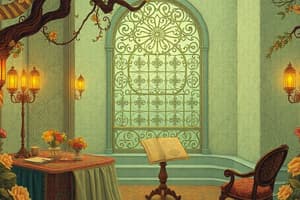Podcast
Questions and Answers
What does art education aim to broaden?
What does art education aim to broaden?
- A person's understanding of history and literature
- A person's knowledge of different art materials and techniques
- A person's understanding, development, and visions of art (correct)
- A person's academic qualifications in various art forms
What was the primary meaning of art for centuries?
What was the primary meaning of art for centuries?
- Being judged solely on its formal qualities
- Eliciting an emotional response from the audience
- The representation or replication of something beautiful or meaningful (correct)
- Expressing a definite feeling as in the sublime or dramatic
What does the Latin word 'ars' mean?
What does the Latin word 'ars' mean?
- Philosophy of beauty and meaning
- Art, skill, or craft (correct)
- Imagination and creativity
- Mimesis and imitation
Which influential theorist believed that art should be judged only on its formal qualities?
Which influential theorist believed that art should be judged only on its formal qualities?
What did Plato first develop the idea of art as in Greek?
What did Plato first develop the idea of art as in Greek?
What does Jean-Paul Sartre define as the role of art?
What does Jean-Paul Sartre define as the role of art?
Why is nature not considered art?
Why is nature not considered art?
What is the role of creativity in art making, according to the text?
What is the role of creativity in art making, according to the text?
What does the text suggest about imagination?
What does the text suggest about imagination?
What is art considered at its root, according to the text?
What is art considered at its root, according to the text?
Flashcards are hidden until you start studying
Study Notes
Art Education and its Goals
- Art education aims to broaden students' understanding of the world and their place in it.
Historical Context of Art
- For centuries, the primary meaning of art was to serve the church and monarchy.
Etymology of Art
- The Latin word 'ars' means skill or craft.
Art Theorists and their Ideas
- Clement Greenberg, an influential theorist, believed that art should be judged only on its formal qualities.
- Plato developed the idea of art as imitation in Greek philosophy.
- Jean-Paul Sartre defines the role of art as a way to express human freedom.
Nature and Art
- Nature is not considered art because it is not created by humans.
Creativity and Imagination in Art
- Creativity plays a crucial role in art making, as it allows artists to bring new ideas into existence.
- Imagination is essential in art, as it enables artists to envision and create something that does not exist in reality.
The Essence of Art
- At its root, art is considered a form of human expression and communication.
Studying That Suits You
Use AI to generate personalized quizzes and flashcards to suit your learning preferences.




